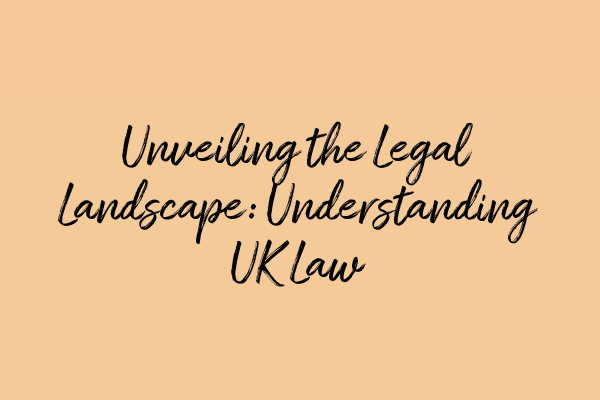Unveiling the Legal Landscape: Understanding UK Law
Understanding the intricacies of the legal system is essential for any individual or business operating within the United Kingdom. The UK law is a vast and complex web of statutes, regulations, and common law principles that govern everything from contractual agreements to criminal proceedings.
In this comprehensive guide, we will delve into the various aspects of UK law, shedding light on key concepts and providing insight into the legal landscape.
The UK Legal System
The UK legal system is based on common law principles, meaning that court decisions and legal precedents play a crucial role in the development of law. The system is hierarchical, with the Supreme Court at the apex, followed by the Court of Appeal, High Court, and lower courts.
It’s important to note that the UK legal system is divided into two main branches: civil law and criminal law. Let’s explore each of these areas in more detail.
Civil Law
Civil law deals with legal disputes between individuals, companies, or organizations. It encompasses a wide range of areas, including contract law, tort law, family law, and property law.
Under contract law, for example, individuals and businesses are bound by legally enforceable agreements. Breaching these agreements can lead to legal consequences, such as monetary damages or injunctions. Contractual disputes are typically resolved through civil litigation, with parties seeking redress through the courts.
Tort law focuses on civil wrongs committed against individuals or their property, such as negligence or defamation. Victims of torts can seek compensation for the harm or injury caused by the wrongful actions of others.
Family law covers matters related to marriage, divorce, child custody, and adoption. This area of law aims to protect the interests of family members and promotes the welfare of children.
Property law regulates the legal rights and obligations concerning land and other forms of real estate. It encompasses issues such as ownership, leasing, and transfer of property.
To navigate the complexities of civil law, it’s crucial to seek expert legal advice. Solicitors specializing in various areas of civil law can guide you through the legal process and protect your rights and interests.
Criminal Law
Criminal law, on the other hand, deals with offenses committed against society as a whole. It involves the prosecution of individuals accused of criminal activities by the state.
The UK criminal law covers a wide range of offenses, from minor infractions to serious crimes. Offenses such as theft, assault, and drug possession fall under criminal law jurisdiction.
When an individual is accused of a criminal offense, the burden of proof lies with the prosecution. The accused is considered innocent until proven guilty beyond a reasonable doubt.
The UK criminal justice system operates on the principle of fair trial and protects the rights of the accused. These rights include the right to legal representation, the right to remain silent, and the right to be presumed innocent.
If you find yourself facing criminal charges, it’s essential to understand your rights and have competent legal representation. Consult an experienced criminal defense solicitor who can guide you through the legal process and build a strong defense on your behalf.
Specialized Areas of UK Law
Within the broad categories of civil and criminal law, there are various specialized areas that require specialized knowledge and expertise. Here are a few examples:
Private Prosecutions
Private prosecutions are non-governmental prosecutions in criminal cases. They are often initiated by individuals or organizations when public prosecutors decline to take legal action. Private prosecutions provide an alternative avenue for seeking justice in criminal matters. Learn more about private prosecutions here.
Rights of the Accused
Protecting individual liberties in criminal proceedings is of utmost importance. The rights of the accused ensure a fair trial and safeguard against wrongful convictions. Understanding these rights is essential for both defendants and their legal representatives. Learn more about the rights of the accused here.
Magistrates’ Court vs. Crown Court
Understanding the key differences between Magistrates’ Court and Crown Court is crucial when facing criminal charges. Each court has distinct jurisdiction and powers, and knowing which court will hear your case is vital. Learn more about Magistrates’ Court vs. Crown Court here.
Protecting Vulnerable Witnesses in Criminal Trials
Criminal trials can be challenging for vulnerable witnesses, such as children or victims of sexual assault. Special measures and legal safeguards are in place to protect these individuals during the legal process. Learn more about protecting vulnerable witnesses here.
UK Bail Laws
Understanding the complexities of UK bail laws is essential if you or someone you know is awaiting trial or facing bail proceedings. The bail process can have a significant impact on the course of a criminal case. Learn more about UK bail laws here.
Get Expert Legal Advice
Whether you’re dealing with a civil dispute or facing criminal charges, it’s crucial to seek expert legal advice. Understanding the complexities of UK law can be overwhelming, but having the right solicitor by your side can make all the difference.
At Become Solicitor SRA, our team of experienced solicitors is well-versed in all areas of UK law. We are dedicated to providing our clients with comprehensive and reliable legal representation.
Ready to navigate the legal landscape? Contact us today to schedule a consultation and discuss your legal needs.


Leave a Reply